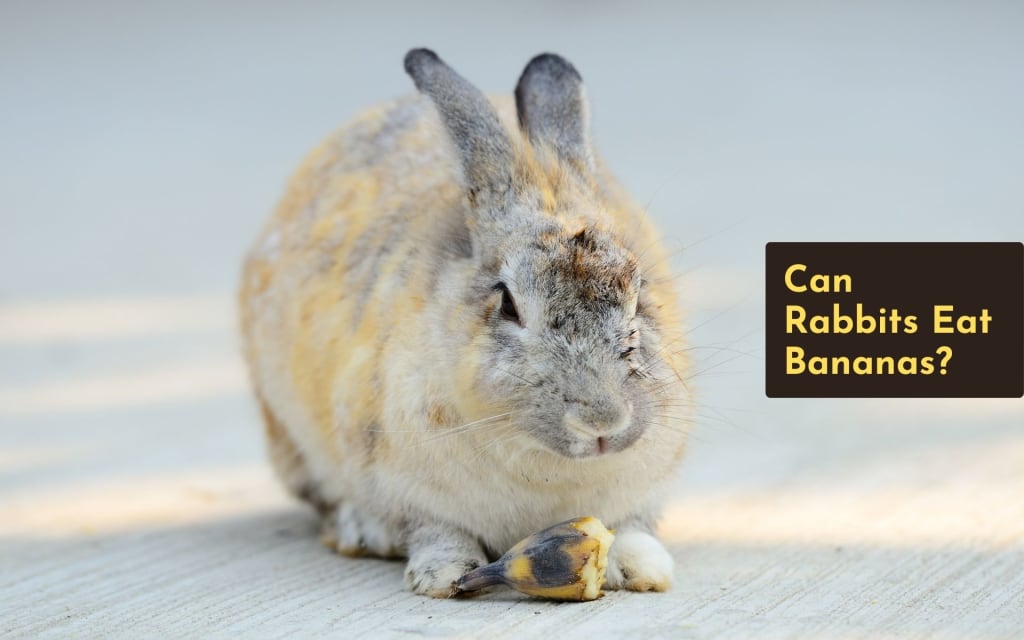Can Rabbits Eat Bananas?
The Bunny's Banana Bonanza

Rabbits are adorable and playful creatures that bring joy to our lives. As responsible pet owners, we are always curious about what we can feed them to ensure their health and happiness. One question frequently arises is whether rabbits can safely indulge in bananas' sweet and creamy goodness. Bananas are a popular fruit known for their delightful taste and numerous health benefits for humans. However, when it comes to rabbits, their nutritional needs differ significantly.
Rabbits have a unique digestive system that requires a high-fiber diet primarily consisting of hay, fresh vegetables, and water. Feed your rabbit a balanced diet; they help prevent digestive issues, maintain dental health, and support overall well-being. While rabbits' diets primarily consist of hay and vegetables, it's natural for pet owners to wonder if they can introduce other fruits into their furry friend's meal plan.
Bananas, with their creamy texture and natural sweetness, often catch our attention as a potential treatment option for rabbits. But it's important to remember that what's healthy and nutritious for humans may not necessarily be the best choice for our little herbivorous companions. To ensure the well-being of our rabbits, we need to explore the nutritional profile of bananas and understand how they can fit into a rabbit's diet, if at all.
In this article, we will address the question, "Can rabbits eat bananas?" by examining the nutritional content of bananas, the potential benefits and risks associated with feeding them to rabbits, and the proper serving size and frequency. We will also discuss the importance of moderation and highlight other suitable treats and dietary components that contribute to a rabbit's overall health.
Can Rabbits Eat Bananas? - Understanding a Rabbit's Diet
Yes, rabbits can eat bananas, as they love bananas. But they should be given in moderation. Rabbits are herbivores, which means their bodies are designed to thrive on a diet primarily composed of plant-based foods. Their digestive systems are uniquely adapted to process a high-fiber diet, which helps maintain their gut health and ensures the proper functioning of their delicate digestive tracts.
The cornerstone of a rabbit's diet is hay. High-quality grass hay, such as timothy, orchard, or meadow grass, should make up most of their food intake. Hay provides the necessary fiber to keep their digestive system running smoothly and helps wear down their continuously growing teeth. It also promotes natural foraging behavior, keeping them mentally stimulated.
In addition to hay, fresh vegetables should be a significant part of a rabbit's daily diet. Leafy greens like kale, spinach, romaine lettuce, and cilantro are excellent choices. These vegetables provide essential vitamins, minerals, and additional fiber that contribute to overall health. Gradually introducing a variety of vegetables is essential, as sudden dietary changes can upset a rabbit's sensitive digestive system.
Water is another vital component of a rabbit's diet. Fresh, clean water should always be available, as rabbits must stay hydrated to support their overall well-being and prevent issues like urinary tract problems.
While hay and vegetables form the foundation of a rabbit's diet, it's important to note that rabbits have different nutritional requirements depending on their age, size, and overall health. It's advisable to consult with a veterinarian who specializes in small animals or rabbits to ensure you're providing the right balance of nutrients specific to your rabbit's individual needs.
Bananas: A Nutritional Profile
Now let's take a closer look at the nutritional profile of bananas and understand how they align with a rabbit's dietary needs. Bananas are a good source of potassium, vitamin C, and dietary fiber, which benefit humans. However, when it comes to rabbits, it's essential to consider the nutritional composition of bananas and how it may impact their health.
Potassium: Bananas are rich in potassium, an essential mineral for various bodily functions, including heart health and nerve function. While potassium is essential for rabbits, it is readily available in other foods they consume, such as leafy greens. Therefore, relying on bananas as rabbits' primary potassium source is unnecessary.
Vitamin C: Bananas contain a modest amount of vitamin C, an antioxidant that supports immune function and overall health. However, rabbits have the remarkable ability to synthesize vitamin C within their bodies. Unlike humans or guinea pigs, rabbits do not require a dietary source of vitamin C to meet their needs. Therefore, the vitamin C content in bananas is not a crucial factor when considering their suitability for rabbits.
Dietary Fiber: Bananas provide dietary fiber essential for maintaining proper digestion and preventing gastrointestinal issues. However, rabbits already obtain a significant amount of fiber from their primary food source, hay. Hay is rich in long-strand fiber, essential for promoting healthy gut motility and preventing conditions like gastrointestinal stasis. While bananas contribute some fiber, it's crucial to prioritize the consumption of hay as rabbits' primary fiber source.
Sugar and Starch: One crucial aspect to consider when evaluating the suitability of bananas for rabbits is their sugar and starch content. Bananas are relatively high in sugars and starches, which can be problematic for rabbits if consumed excessively. Rabbits have sensitive digestive systems not well-adapted to handling large amounts of sugar and starch. Overconsumption of these carbohydrates can disrupt the delicate balance of gut bacteria and potentially lead to digestive issues such as diarrhea, bloating, or obesity.
Considering the nutritional profile of bananas, it becomes apparent that while they offer some beneficial nutrients, their high sugar and starch content may pose risks for rabbits. Therefore, it's vital to approach bananas as an occasional treat rather than a regular dietary component for your bunny companion.
Moderation is Key
When it comes to feeding rabbits bananas, moderation is crucial. While bananas can be a tasty and tempting treat, offering them in limited quantities is important to avoid potential health issues for your rabbit. Here's why moderation is key when it comes to bananas:
Sugar and Starch Content
As mentioned earlier, bananas contain relatively high natural sugars and starches. These carbohydrates can lead to weight gain and contribute to dental problems if consumed excessively. Additionally, rabbits have a delicate digestive system adapted to a high-fiber diet. Overconsumption of sugary and starchy foods like bananas can disrupt their gut flora and potentially lead to digestive upset, including diarrhea and bloating.
Balanced Diet
Rabbits require a balanced diet that consists primarily of hay and fresh vegetables. These provide the necessary fiber, vitamins, and minerals to maintain health. While bananas can offer some nutritional value, they should not replace or overshadow the main components of a rabbit's diet. It's important to prioritize hay as the primary source of fiber and vegetables as the main provider of essential nutrients.
Weight Management
Obesity is a common issue among pet rabbits, and excessive consumption of high-sugar foods can contribute to weight gain. Monitoring your rabbit's weight and body condition regularly and adjusting their diet is crucial. Limiting treats like bananas and focusing on a balanced diet can help maintain a healthy weight for your rabbit and reduce the risk of obesity-related health problems.
Individual Tolerance
It's important to remember that each rabbit is unique, and their tolerance to certain foods may vary. Some rabbits may be more sensitive to sugary or starchy foods than others. Observe their response when introducing bananas or new food into your rabbit's diet. If you notice any digestive issues or changes in appetite, it's best to discontinue feeding bananas and consult a veterinarian for guidance.
So, how can you incorporate bananas into your rabbit's diet moderately and responsibly? Offer small portions of banana as an occasional treat, about the size of your thumb, once or twice a week. Removing the peel and thoroughly washing the banana to eliminate potential contaminants is advisable.
Proper Serving Size and Preparation
When offering bananas to your rabbit, ensuring the right serving size and proper preparation is essential. Here are some guidelines to follow:
Serving Size: The serving size of bananas for rabbits should be small. Offer a slice of banana approximately the size of your thumb once or twice a week. This small portion allows your rabbit to enjoy the flavor and texture of the banana without overloading them with excess sugars and starches.
Peel Removal: Remove the peel before giving it to your rabbit. The digestive systems are not designed to process the tough banana peel, and it can pose a choking hazard. Additionally, thoroughly wash the banana to remove any potential pesticides or contaminants that might be present on the skin.
Organic and Fresh: Whenever possible, choose organic bananas for your rabbit. Organic produce is typically grown without harmful pesticides, reducing the risk of exposing your rabbit to potentially toxic substances. Freshness is also essential, as overripe or spoiled bananas can cause digestive issues.
Introduce Gradually: If you're offering bananas to your rabbit for the first time, it's essential to introduce them gradually. Start with a small piece and observe your rabbit's response over the next 24 hours. Look for any signs of digestive distress, such as loose stool or changes in appetite. If your rabbit tolerates the banana well, you can continue moderately offering it.
Variety is Key: While relying solely on bananas as a treat for your rabbit may be tempting, it's important to remember that a varied diet is essential for their overall health. Instead of focusing solely on bananas, provide a range of fresh vegetables and high-quality hay to ensure a well-rounded diet. These foods provide the necessary fiber, vitamins, and minerals that rabbits need for optimal well-being.
Monitor Your Rabbit's Response
When introducing new food into your rabbit's diet, including bananas, monitoring their response closely is important. While bananas can be a safe treat for rabbits when offered in moderation, individual rabbits may react differently. Here are some key points to consider when monitoring your rabbit's response to bananas:
Digestive Distress
Watch for any signs of digestive distress after your rabbit consumes bananas. This includes a loose stool, changes in bowel movements, or an upset stomach. If you notice any unusual digestive symptoms, it's best to discontinue feeding bananas and consult with a veterinarian for guidance.
Changes in Appetite
Pay attention to your rabbit's appetite after consuming bananas. If they suddenly lose interest in their regular hay or vegetable intake, it could be a sign that the bananas are causing an imbalance in their diet. Ensure that their overall food consumption remains consistent and that they still consume adequate hay and fresh vegetables.
Allergic Reactions
Although rare, some rabbits may have allergies or sensitivities to certain foods, including bananas. Look for signs of allergic reactions, such as itching, hives, or respiratory difficulties. If you notice these symptoms, discontinue feeding bananas immediately and seek veterinary assistance.
Individual Variations
Each rabbit is unique, and their tolerance to certain foods can vary. While one rabbit may enjoy and tolerate bananas without any issues, another rabbit may have a sensitive digestive system that reacts negatively. Observe your rabbit's response and adjust its diet based on specific needs and sensitivities.
Remember that rabbits thrive on a diet of hay and fresh vegetables. While bananas can provide a small amount of variety and enjoyment as a treat, they should not replace or overshadow the main components of their diet. Always prioritize a balanced and nutritionally complete diet for your rabbit's overall well-being.
In case of any concerns or uncertainties about your rabbit's diet or reaction to specific foods, it's advisable to consult a veterinarian specializing in small animals or rabbits. They can provide personalized guidance based on your rabbit's needs and help ensure they receive the best care.
Variety is Essential
Variety is key when providing a well-rounded and nutritious diet for your rabbit. While bananas may be an occasional treat, it's important to emphasize the importance of offering a diverse range of foods to meet your rabbit's nutritional needs. Here's why variety is essential in a rabbit's diet:
- Nutritional Balance: Different foods offer unique combinations of vitamins, minerals, and nutrients. By incorporating a variety of fresh vegetables into your rabbit's diet, you ensure they receive a broader spectrum of essential nutrients. Each vegetable contributes vitamins, minerals, and antioxidants, promoting overall health and preventing nutrient deficiencies.
- Fiber Content: While hay forms the foundation of a rabbit's diet, offering a variety of fresh vegetables helps diversify their fiber intake. Different vegetables have varying fiber compositions, including soluble and insoluble fiber. This diversity of fibers supports optimal gut health and motility, preventing digestive issues and maintaining a healthy balance of gut bacteria.
- Enrichment and Mental Stimulation: Offering a variety of foods provides essential nutrients and enhances your rabbit's mealtime experience. Rabbits are natural foragers, and presenting them with a selection of vegetables stimulates their instincts. It adds interest to their diet, prevents boredom, and promotes mental stimulation, leading to a happier and more contented rabbit.
- Preventing Selective Eating: Rabbits can develop preferences and become selective eaters like many animals. Regularly introducing new vegetables and rotating their selection can discourage selective eating behaviors. This ensures that your rabbit receives a wide range of nutrients from different sources and avoids excessive reliance on a single type of food.
Wrapping Up
In conclusion, while bananas may seem like a tasty option to share with your rabbit, exercising caution and moderation is essential. Offering a small slice of banana as an occasional treat can be a delightful and safe way to pamper your furry friend.
However, it's crucial to prioritize a balanced diet focusing on hay and fresh vegetables to meet their nutritional needs. Constantly monitor your rabbit's response to new foods and consult with a veterinarian for any specific dietary concerns. Remember, the key to a healthy bunny is a well-balanced and varied diet that promotes overall health and happiness.
👉 Do you have any additional insights or questions? We highly value your feedback. Please share your thoughts by leaving a comment below.
About the Creator
Amir Hossain
I blog on everything and anything— hoping my blogs will make your days a bit happier!






Comments
There are no comments for this story
Be the first to respond and start the conversation.